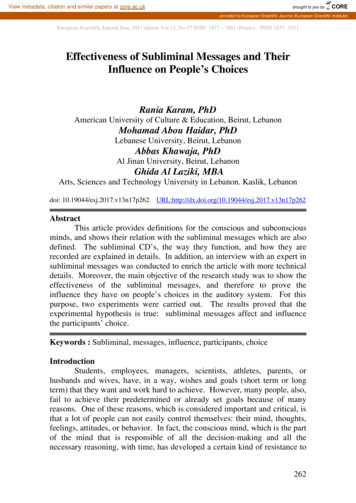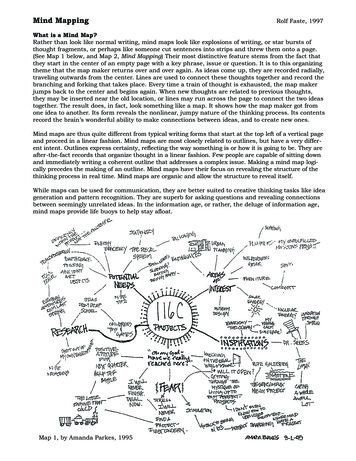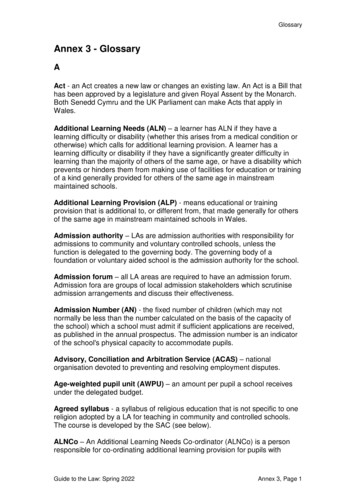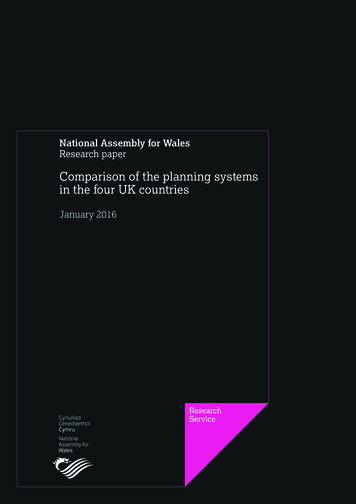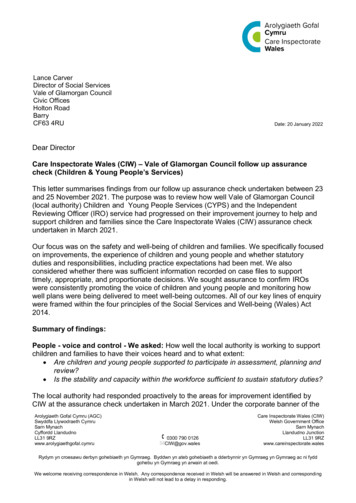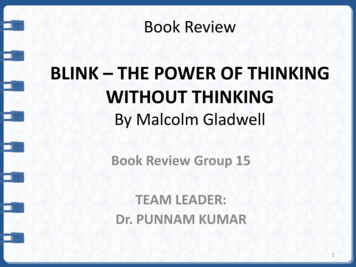
Transcription
National Assembly for WalesChildren, Young People and Education CommitteeMind over matterA report on the step change needed inemotional and mental health support forchildren and young people in WalesApril 2018www.assembly.wales
The National Assembly for Wales is thedemocratically elected body that representsthe interests of Wales and its people, makeslaws for Wales, agrees Welsh taxes and holdsthe Welsh Government to account.An electronic copy of this document can be found on the National Assemblywebsite: www.assembly.wales/SeneddCYPECopies of this document can also be obtained in accessible formats includingBraille, large print, audio or hard copy from:Children, Young People and Education CommitteeNational Assembly for WalesCardiff BayCF99 1NATel: 0300 200 6565Email: SeneddCYPE@assembly.walesTwitter: @SeneddCYPE National Assembly for Wales Commission Copyright 2018The text of this document may be reproduced free of charge in any format ormedium providing that it is reproduced accurately and not used in a misleadingor derogatory context. The material must be acknowledged as copyright of theNational Assembly for Wales Commission and the title of the document specified.
National Assembly for WalesChildren, Young People and Education CommitteeMind over matterA report on the step change needed inemotional and mental health support forchildren and young people in WalesApril 2018www.assembly.wales
About the CommitteeThe Committee was established on 28 June 2016 to examine legislation and hold theWelsh Government to account by scrutinising its expenditure, administration and policymatters, encompassing (but not restricted to): the education, health and well-being ofthe children and young people of Wales, including their social care.Committee Chair:Lynne Neagle AMWelsh LabourTorfaenCurrent Committee membership:Michelle Brown AMUKIP WalesNorth WalesHefin David AMWelsh LabourCaerphillyJohn Griffiths AMWelsh LabourNewport EastLlyr Gruffydd AMPlaid CymruNorth WalesDarren Millar AMWelsh ConservativesClwyd WestJulie Morgan AMWelsh LabourCardiff NorthMark Reckless AMWelsh Conservative GroupSouth Wales East
The Emotional and Mental Health of Children and Young People in WalesContentsChair’s foreword . 51. Background. 81. 1. Children and young people’s mental health and well-being . 101. 2. Our inquiry . 11Our evidence gathering. 121. 3. Context . 14Together for Children and Young People (T4CYP) Programme . 14Funding .15New service teams and targets .15Curriculum reform . 162. Emotional well-being, resilience and early intervention . 182. 1. The role of education . 20Prevalence of emotional and mental health issues in school-agechildren . 22Emotional well-being and mental health in the curriculum .25Well-being as an educational priority . 302. 2. A whole-school approach, a cross-sector responsibility .34Schools.34Roles of other professionals . 40Implementation of the whole-school approach . 452. 3. Support outside school . 56Primary care .57Youth work services in the community . 613. Specialist services . 663. 1. Access to specialist services . 68Variation in practice. 70Referral criteria and thresholds . 71The “missing middle” . 76
The Emotional and Mental Health of Children and Young People in WalesWaiting times. 773. 2. Structure and delivery of specialist services. 87Crisis and out-of-hours care . 89In-patient care and out-of-area placements . 97Transition from child to adult services . 103Psychological therapies and the use of medication .106Advocacy . 110Support for vulnerable groups . 1133. 3. Resourcing specialist services . 120Workforce . 120Funding . 126Annex A – Indicative allocations of the additional CAMHS fundingby health board . 129Annex B – Oral witnesses . 130Annex C – Written evidence . 134
The Emotional and Mental Health of Children and Young People in WalesChair’s forewordSupport for the emotional and mental health of children and young people inWales has been too limited for too long. We believe that the time has come to putmind over matter and deliver appropriate, timely and effective emotional andmental health support for our children and young people, once and for all.We recognise the improvement made in specialist children and adolescentmental health services (CAMHS) in the last two years.But it is not enough.It is estimated that three children in every average size classroom will have amental health issue. By the age of 14, half of all mental health problems will havebegun. To stem the flow, we need a step change. We need to equip our childrenwith the skills, confidence and tools to be emotionally resilient. We need tointervene much earlier, addressing the seeds of distress before they take root.This will not be achieved through piecemeal change. Differences in the processes,structures, funding, cultures, knowledge and training of the various players –including health, education, local authorities, the third sector and the criminaljustice system – mean a joined-up approach is crucial if the vision of child-centredsupport is to be delivered. Building a resilient, emotionally and mentally healthypopulation of children and young people has to be a stated national priority. Butwords alone will not do – they need to be underpinned by the planning, resourceand commitment required to deliver real change.For that reason we make one key recommendation. We state that the urgentchallenge now lies at the “front end” of the care pathway – emotional well-being,resilience and early intervention – and that addressing this should be a statednational priority for the Welsh Government. Failure to deliver at this end of thepathway will lead to demand for specialist services outstripping supply,threatening their sustainability and effectiveness.In line with the status of national priority, we think ring-fenced resource is neededto make schools community hubs of cross-sector and cross-professional supportfor emotional and mental well-being. We also think everyone who works withchildren and young people should be trained in emotional and mental healthawareness, to tackle issues of stigma, promote good mental health and enablesignposting to support services where necessary. We think that this, more thananything, will enable us to deliver the step change that is urgently needed if we5
The Emotional and Mental Health of Children and Young People in Walesare to help prevent and manage the emotional, behavioural and mental distressexperienced by an increasing number of our children and young people.We recognise, however, that we cannot prevent all illness. To that end, we make aseries of recommendations for improvements to the community and specialistservices that are so important for the treatment of some of our most vulnerableand unwell children and young people. We recognise the enormous amount ofwork staff across public and voluntary services do on a daily basis to supportchildren and young people in emotional or mental distress. We believe that theyneed further assistance to achieve the outcomes our children and young peopledeserve.Our predecessor Committee was told in 2014 that too many children and youngpeople entering specialist CAMHS were being referred there incorrectly and oughtto be helped in other parts of the system. By 2018, not enough has changed. Thepieces of the jigsaw that need to be in place to enable children and young peopleto be supported outside the most specialist settings are simply not there. Fouryears since the last inquiry, this is unacceptable and must be addressed urgentlyby the Welsh Government.This is a subject that touches us all, and an area in which we all have aresponsibility – and an ability – to make change happen. We are unwilling to allowthis significant issue to be passed on yet again to a successor Committee withrepeated conclusions of “more work left to be done”. The time has come to putmind over matter and make the step change that is so urgently needed.Lynne Neagle AMChair, Children, Young People and Education Committee6
Chapter 1:BackgroundWe launched our inquiry in July 2017. Ouraim was twofold: to build on our predecessorCommittee’s work in 2014 on specialist childand adolescent mental health services, andto look in more detail at the support availablefor children and young people’s emotionalwell-being, including prevention and earlyintervention services.Our report makes one key recommendation,and 27 others. Taken together, we believethese will deliver the step change that isneeded to build a population of emotionallyresilient and mentally healthy children andyoung people in Wales.
The Emotional and Mental Health of Children and Young People in Wales1. 1. Children and young people’s mental health and well-being1.Across the UK, it is estimated that one in four children will show someevidence of mental ill health, and three children in an average size classroom willhave a mental health problem.1 Half of all mental health problems begin by theage of 14, and three-quarters by an individual’s mid-20s.22.Wales is no exception. Time to Change Wales – an alliance of leading Welshmental health charities – reports that one in ten young people will experience amental health problem, and nearly three in four young people fear the reaction offriends when they talk about it.3 Mental health is the issue most commonly raisedwith the Children’s Commissioner for Wales by children, young people, theirparents and carers, and was highlighted as a key priority when this Committeeconsulted on our work programme shortly after the Assembly elections in May2016.43.Without support, mental distress can have a severe impact on children’shappiness, well-being and development, their educational attainment and theirpotential to live fulfilling and productive lives. Children and young people withmental health problems also face stigma, isolation and discrimination, as well aschallenges in accessing health care and education. But these are not inevitableconsequences of mental distress. Evidence shows that with appropriate andtimely intervention and support, children and young people can live well andhappy lives.1Young Minds, Impact Report 2016-17 and Wise up to Wellbeing in Schools2World Health Organization, Child and adolescent mental health, accessed March 20183Time to Change Wales, Myths and Facts, accessed March 2018Children, Young People and Education Committee, Consultation: Priorities for the CYPECommittee, July – September 2016410
The Emotional and Mental Health of Children and Young People in Wales1. 2. Our inquiry4.In light of concerns about the increase in the prevalence of mental healthproblems among children and young people, and in response to our predecessorCommittee’s and stakeholders’ calls for further work to be undertaken in this area,we announced our inquiry into the emotional and mental health of children andyoung people in Wales in July 2017.5.We had two main aims for this work: to assess whether the “root and branch” review to modernise andredesign services announced by the Welsh Government in October 2014– which led to the establishment of the Together for Children and YoungPeople Programme in February 2015 - is on track to deliver the stepchange in child and adolescent mental health services (CAMHS)provision identified as necessary by our predecessor Committee’s report;and to establish whether early intervention, prevention and resilienceservices were in place to support the emotional well-being of childrenand young people in Wales.6.We also wanted to ensure that we did not focus on diagnosable mentaldisorders alone – we recognise that mental illness spans a wide range ofemotional, behavioural and psychological problems. We further recognise thatmental health should not only be seen through a negative prism – positivedimensions such as life satisfaction, happiness and resilience also need to beconsidered, especially when identifying the steps that need to be taken tosupport the emotional well-being of our children and young people.7.Our terms of reference identified specialist CAMHS, funding, transition toadult services and links with education as headline areas of interest. We alsowanted to re-visit areas of concern highlighted by our predecessor Committee,including referral arrangements, waiting times, out-of-hours and crisis care, inpatient capacity, psychological therapy, and support in the community.8.However, we did not want to concentrate on the most specialist services only.We were also keen to consider what support could be provided to avoidescalation to specialist services where possible. Provision in schools to helpencourage emotional resilience and healthy coping mechanisms, particularlyopportunities afforded by the development of the new curriculum, were of stronginterest to us. We also wanted to measure the extent to which joint working11
The Emotional and Mental Health of Children and Young People in Walesbetween health, education, social services, youth work, and the third sector washelping to create an environment in which people could discuss emotional wellbeing and mental health without fear or stigma.Our evidence gathering9.In light of the breadth and importance of this subject, we undertook asubstantial evidence gathering exercise to inform our conclusions andrecommendations. Annexes B and C of this report provide full details of thewritten and oral evidence we received, all of which is available publicly.10. Given the reported prominence of emotional and mental health in theminds of children and young people, and the direct impact it can have on themand those around them, we were also keen to ensure that we reached out beyondthe Senedd to hear from those with first-hand experience.11. To explore the extent to which emotional and mental health support isprovided in schools, we held a roundtable meeting with over 40 frontlineprofessionals providing a range of services in the school setting. We alsoconducted two surveys – one for children and young people in secondaryschool/college and one for education professionals.12. During the course of our inquiry we also visited a number of settingsproviding a range of emotional and mental health support. These includedspecialist in-patient units, a primary school, a third sector youth project and asecure children’s home.13. We are grateful to all those who took the time to contribute to our inquiry,but particularly those children and young people who shared their views andexperiences so willingly and openly with us.12
HOW WE GATHERED EVIDENCEWe wanted our report and recommendations to be informed by the direct experiencesof children and young people, and those providing support to them. To do this, weconducted visits, hosted a roundtable discussion and ran a survey which received over2000 responses.OUR VISITSWe visited services across Wales to hearfrom those receiving and delivering arange of emotional and mental healthsupport.Ysgol Pen y BrynColwyn BayNorth Wales Adolescent ServiceAbergeleHillside Secure Children’s HomeNeathTŷ Llidiard Inpatient UnitBridgendChanging Minds ProjectNewportSURVEY RESPONSES1611 children and young peoplein secondary schools and colleges;425 education professionals.ORAL EVIDENCESESSIONS21 (and 75 witnesses)ROUNDTABLEPARTICIPANTS40 from frontline healthand education services.WRITTENSUBMISSIONS67 23 additional papers
The Emotional and Mental Health of Children and Young People in Wales1. 3. ContextTogether for Children and Young People (T4CYP) Programme14. The T4CYP Programme is a multi-agency service improvement programme,led by the NHS. Its stated aim is to reshape, remodel and refocus the emotionaland mental health services provided for children and young people in Wales. TheProgramme has adopted a “windscreen” model to develop the resilience of allchildren and young people in Wales, to intervene early for those at risk, and toensure that those with mental illness get access to specialist CAMHS as quickly aspossible.Figure 1: T4CYP windscreen modelSource: T4CYP Programme – Framework for Action15. The T4CYP Programme operates based on work streams that focus on:universal resilience, well-being, early years and early intervention;neurodevelopmental (ND) needs; and specialist CAMHS. Other cross-cuttingstreams include: workforce, education and training; care transitions; and HealthNeeds Assessment.16. The Welsh Government established the T4CYP Programme initially for athree-year period, ending in March 2018. During the course of our current inquiry,the Welsh Government announced the extension of the Programme untilOctober 2019.55Written evidence, EMH 68 – Welsh Government14
The Emotional and Mental Health of Children and Young People in WalesFunding17. In May 2015, the Welsh Government announced an additional 7.65 millioninvestment (recurrent on an annual basis) towards improving mental healthservices for children and young people.6 This was to be used alongside funding forchildren and young people services in the “general mental illness” and “othermental health problems” expenditure lines within the Health, Well-being andSport Main Expenditure Group.New service teams and targets18. As part of the T4CYP Programme’s work and as a result of the additionalfunding allocated in 2015, steps have been taken by all health boards (with someahead of others) to establish a number of new service teams to work alongsidespecialist CAMHS and local primary mental health teams. A number ofperformance targets have also been set with a view to driving serviceimprovement. The teams involved are: Neurodevelopmental (ND) Service teams – to provide multidisciplinaryassessment, diagnosis and treatment, information and advice forchildren and young people with a ND disorder (including autismspectrum disorder (ASD), attention-deficit/hyperactivity disorder (ADHD)and Tourette's Syndrome), and their families. All children and youngpeople should be assessed within 26 weeks of referral; Community Intensive Treatment / Crisis teams – to support children andyoung people who present in crisis (with availability out-of-hours and atweekends). All children and young people with urgent needs should beseen within 48 hours, reduced from the previous target of 4 weeks; Early Intervention in Psychosis teams – to support young people aged 15to 24 with first episode and early psychosis; and Existing specialist CAMHS teams have been set a waiting time target of28 days from referral to assessment, replacing the previous target of 16weeks referral to treatment.Welsh Government, 7.6m funding boost for children and young people’s mental health servicesin Wales, 22 May 2015615
The Emotional and Mental Health of Children and Young People in WalesCurriculum reform19. Professor Graham Donaldson published his independent review ofcurriculum and assessment arrangements in Wales, Successful Futures, inFebruary 2015. This review has informed the process of developing a newcurriculum for settings and schools in Wales. The new curriculum will be phasedin from September 2022 onwards (starting with primary schools and year 7 in2022, moving upwards through year groups on an annual basis thereafter).20. The Welsh Government states:“The whole approach to developing young people aged 3 to 16 willchange. The new curriculum will have more emphasis on equippingyoung people for life. It will build their ability to learn new skills andapply their subject knowledge more positively and creatively. As theworld changes, they will be more able to adapt positively.”721. The new curriculum will have six “Areas of Learning and Experience” (AoLE).One of these will focus on health and well-being.7Welsh Government, New school curriculum, 31 January 2018 update16
Chapter 2:Emotionalwell-being,resilience and earlyinterventionWith three children in an average sizeclassroom having a mental health issue, moreresilience and early intervention work isneeded as a matter of urgency.The costs of emotional and mental ill health –both personally to the individuals and familiesinvolved, and to the public purse – are toohigh for us not to try to stem the flow earlier.Reform of the curriculum in Wales offersa once-in-a-generation opportunity toembed well-being into our children’s lives.Furthermore, schools are ideally placed tomake a significant contribution to buildingan emotionally resilient population of youngpeople, reducing stigma and promoting goodmental health.But they cannot do it alone. Support fromother statutory and third sector bodies,most notably health, is essential. The wholeschool approach needs to be a cross-sectorresponsibility and a step change is needed todeliver it.Support is also needed outside the schoolenvironment. Services available in thecommunity, via primary care, need urgentattention.
The Emotional and Mental Health of Children and Young People in Wales2. 1. The role of education22. There was a strong consensus in the evidence submitted to our inquiry that: education settings, including primary schools, secondary schools,colleges and universities, are key to promoting emotional well-beingand good mental health; levels of stress and anxiety among pupils are rising, highlighting howimportant it is that schools and colleges help promote well-being andsupport children and young people to develop the resilience and skillsneeded to deal with stress and anxiety; it is crucial to develop a whole-school approach, embedding well-beinginto the entire school ethos, the curriculum, and staff training andprofessional development. A substantial step change is needed torealise this ambition. Furthermore, a whole-school approach does notmean schools meeting pupils’ needs on their own – the involvement of arange of professionals from other agencies is needed; the current reform of the curriculum presents a once-in-a-generationopportunity to mainstream emotional well-being and mental health ineducation; and school-based staff, including teachers, often lack the confidence andcapacity to help pupils with their emotional and mental health. Therecan be a particular fear of making things worse and therefore atendency to refer to health professionals, adding to the pressures onalready in-demand services.23. The Samaritans summed up the general views articulated by stakeholders:“Emotional health programmes in schools should be viewed as a formof promotion, prevention and early intervention which could reducepressure on CAMHS, reduce specific mental health problems andincrease academic achievement.”88Written evidence, EMH 33 - Samaritans20
What children and young people told us aboutthe role of educationDuring our inquiry we conducted visits and ran a survey with secondaryschool pupils across Wales so that we could hear directly from childrenand young people. Here are some of the things they told us:“I feel like there should be more access to support in schools anda lot more notice that the support is available.”50% of the young people surveyed told us that their school or collegegives information to them – or that they know where to get information –about emotional well-being and mental health.“More emphasis must be put on reducing stigma aroundmental health issues. Often people worry they will be judged foradmitting to having a problem.”19% of young people who responded to our survey had used school orcollege based counselling. They told us that there were “nowhere nearenough” counselling services available and that “it’s not a fun experiencehaving to go and knock on the door and not wanting others to knowabout your anxiety.”“If teachers had a little bit more training to catch bad mentalhealth, it doesn’t matter if you’ve got depression or anxiety, badmental health is bad mental health, from not having enoughsleep to worrying about exams, it all affects us.”52% of young people who responded to our survey said their schoolor college was good or very good at helping them cope with exampressure, bullying and peer pressure.“Mental health is not given the amount of lesson time it deservesconsidering the devastating effects it has.”65.9% of young people who responded to our survey said they wouldlike their school or college to teach them more about how to look aftertheir emotional well-being and mental health.Primary school children at Ysgol Pen y Bryn told us how mindfulnesshelped them:“It helps me when I’m worried It calms me down – I use it outsideschool.”
The Emotional and Mental Health of Children and Young People in WalesPrevalence of emotional and mental health issues in school-age children24. Action for Children highlighted that: the proportion of 15-16 year olds self-reporting anxiety or depression hasdoubled in recent years; one in ten 5-16 year olds suffers a diagnosable mental health disorder;and between 10-15 per cent of teenagers have some symptoms ofdepression at any one time.925. In addition to the increase in prevalence of emotional, behavioural andmental health issues, head teachers’ representatives told us that those difficultiesare more profound now than in the past and emerging among those of a muchyounger age than previously was the case:“ the mental health issues we have around children and young peoplenow are quite serious, and far more serious than they were [ ] If I thinkback to the start of my career, which is probably about 20-odd yearsago, in primary, I don’t recall seeing anything like the sorts of things weare seeing now amongst young people.”1026. Contributing factors to the increase in prevalence of these issues that werecited included: pressure to achieve academically (and associated restrictions on thescope for children and young people to do subjects other than English,maths and sciences, restricting their ability to do subjects they enjoy11);and the influence of – and pressure from –
The Emotional and Mental Health of Children and Young People in Wales 10 . 1. 1. Children and young people's mental health and well-being . 1. Across the UK, it is estimated that one in four children will show some evidence of mental ill health, and three children in an average size classroom will have a mental health problem. 1

